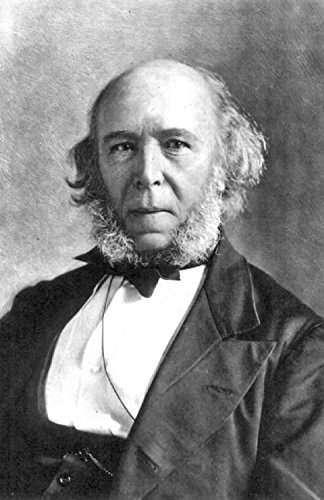
Herbert Spencer was an English philosopher and sociologist caricatured by “survival of the fittest”. Recent scholarship has begun repairing his theory.
Below is an excerpt from a biography of Herbert Spencer included with our books.
| Title | Published |
|---|---|
| Principles of Biology | 1898 |
| The Man Versus the State | 1884 |
Herbert Spencer was born on April 27, 1820 in Derby, England. His father, William George Spencer, was a religious dissenter who drifted from Methodism to Quakerism. His father seemed to transmit to Hebert Spencer an opposition to all forms of authority.
Herbert Spencer was educated in empirical science by his father who introduced him to pre-Darwinian concepts of biological evolution.
Spencer’s uncle, Thomas Spencer, completed Spencer’s limited formal education by teaching him mathematics, physics, and Latin. His uncle also imprinted on his nephew his own firm free-trade and anti-statist political views.

Herbert Spencer did not receive any formal higher education. As a young man Spencer found it difficult to settle to any intellectual or professional discipline. He worked as a civil engineer during the railway boom of the late 1830s in England.
From 1848 to 1853 he served as sub-editor on the free-trade journal The Economist. He published his first book, Social Statics during the period.
John Chapman, the publisher of The Economist, introduced Hebert Spencer to his salon which was attended by John Stuart Mill, Harriet Martineau, George Henry Lewes, and Mary Ann Evans.
Thomas Henry Huxley, one of the greatest biologists, won fame as ‘Darwin’s Bulldog’ and remained Spencer’s lifelong friend.
It was Evans and Lewes that acquainted him with John Stuart Mill’s A System of Logic and with Auguste Comte’s positivism.
The first fruit of his friendship with Evans and Lewes was Spencer’s second book Principles of Psychology that was published in 1855. The book was written on the fundamental assumption that the human mind was subject to natural laws and that these could be discovered within the framework of general biology. Spencer deeply explored a physiological basis for psychology in the book and believed that The Psychology would do for the human mind what Isaac Newton had done for matter.
In 1858 Spencer produced an outline of what was to become the System of Synthetic Philosophy. He tried to demonstrate that it was possible to show that everything in the universe – including human culture, language, and morality – could be explained by laws of universal validity. The principle of evolution can be applied in biology, psychology, sociology, and morality.
Spencer also invented a precursor to the modern paper clip shown below.



Spencer’s philosophical system seemed to demonstrate that it was possible to believe in the ultimate perfection of humanity on the basis of advanced scientific conceptions such as the first law of thermodynamics and biological evolution.
In essence Spencer’s philosophical vision was formed by a combination of deism and positivism. The tension between positivism and his residual deism ran through the entire System of Synthetic Philosophy.
Heber Spencer was never married. After 1855, he complained endlessly of pains and maladies that no physician could diagnose. The last decades of Spencer’s life were characterized by growing disillusionment and loneliness.
He continued writing in later years until he succumbed to poor health at the age of 83. His ashes are interred in the eastern side of London’s Highgate Cemetery facing Karl Marx’s grave.
The Indian nationalist leader Shyamji Krishnavarma donated £1,000 to establish a lectureship at Oxford University in tribute to Spencer and his work.
